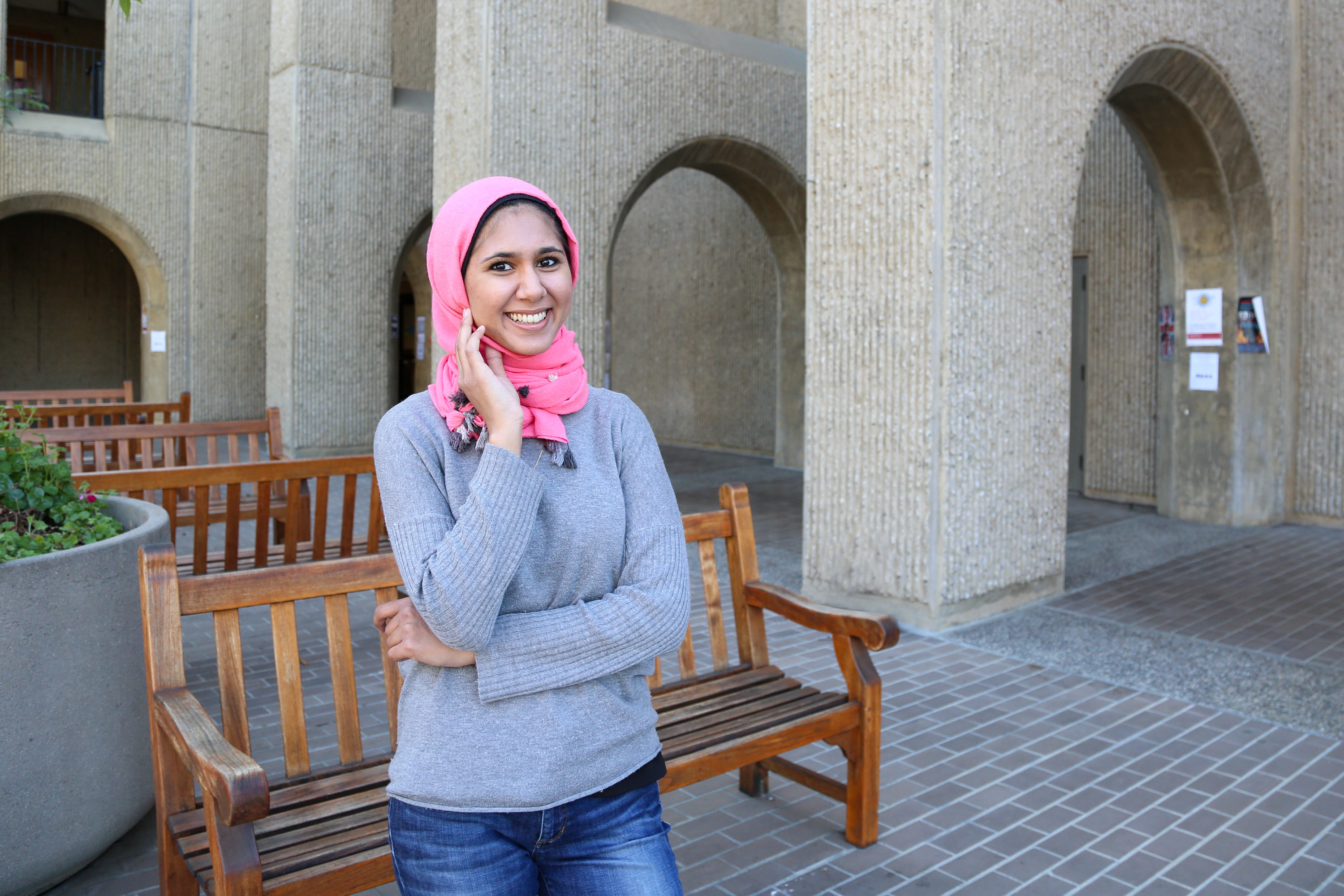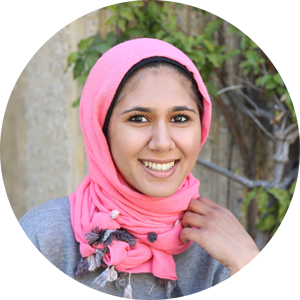
Maryam Hassan
You're more than halfway through STEP-Elementary. How would you describe the experience?
This experience has been a whirlwind of a year. I am so excited and proud of the work I’ve been able to accomplish here, both in my coursework and at my school site placement. I’ve had the privilege of working with experienced teachers, diverse students and supportive colleagues. I can’t really describe in words the amount of an impact this program has had on my life and my teaching practice. I’m gaining a wealth of knowledge, and I’m looking forward to taking all the skills I’ve developed to benefit my students, present and future. It is going by way too fast.
How has your teaching changed since STEP began in June?
As result of being immersed in this program, I feel that I have become a more reflective and intentional teacher. Before STEP, I would plan lessons and make decisions without any reasoning or theory to back up what I was doing. Now, I am able to think critically and deeply about every decision I make, from where I want students to sit to how I can authentically assess learning. I plan my lessons like an engineer, constantly building and designing lessons and learning segments that are geared toward a specific group of students in mind. I’ve learned to be flexible and to make adjustments when necessary while providing necessary scaffolds to ensure students succeed.
In STEP, it is easy to see and apply the connections between theory and practice. I have had many opportunities to apply what I’m learning in my coursework, directly in the classroom. Furthermore, I’ve learned that teaching is an incredibly complex art and that one should approach it with compassion, both for oneself and for others.
How would you describe the other STEP students?
The students here are dynamic, well rounded, collaborative and extremely dedicated to the teaching profession. I look up to these people and see them as one of my most valuable resources here at Stanford. My colleagues continue to inspire me and challenge me to grow each day inside and outside the classroom. We are constantly bouncing ideas off of each other for lessons, and we are supportive of each other in our current job search quest. Everyone has a plethora of background experiences and knowledge in the field of education, which transfers over into our classroom discussions and conversations during coffee breaks. The students here are passionate about what they do.
Even though our program is jam packed, there are several individuals who have taken it upon themselves to go above and beyond what is expected. In the elementary cohort for example, one of my peers took the initiative to apply for a grant to support a restorative justice workshop for GSE students. Others in the elementary cohort are leading a Newbery book club that was started by the director of our program (we are currently reading The One and Only Ivan). These events, big and small, have helped build a sense of community, and they provide a pleasant break from the stress that can come with teaching and coursework.
What led you to choose Stanford as the place to learn to be a teacher?
I first discovered this program two years ago when I started researching different teacher education programs. STEP instantly caught my attention. I remember reading the mission statement and looking over student profiles, thinking to myself, this is exactly the type of program I want to be a part of, one that believes in equitable teaching for all students. I knew that at Stanford, I would have access to top faculty who are experts in their field. I knew that I would be receiving the best teacher education possible.
Upon admission into the program, I had to start thinking about how I would finance my degree. On admit day, I learned more about the program including details about coursework, housing and financial aid. Stanford offered me a fellowship and a financial aid package with a generous amount of forgivable loans including the Dorothy Avery Loan, which influenced my ability to attend this program.
More than anything else, it is the people and the support network that make this program stand out from the rest. Everyone here is dedicated to supporting us in our development towards becoming effective teachers.
What were you doing prior to applying to the GSE?
Prior to STEP, I served as an Americorps member for two years. I graduated from UC Berkeley in 2013 not really knowing which direction I wanted to go in with my career. I jumped on an opportunity to work with youth through a nonprofit organization called Super Stars Literacy, which serves Title I elementary schools in the East Bay. I had the opportunity to work in low-income communities in Hayward and Oakland, and I fell in love with the students and families I worked with.
During my service, I led a literacy based afterschool program for first graders. In the daytime, I supported teachers and students by doing pullout and push-in intervention. I enjoyed working with youth in that setting, however, it didn’t feel like enough; I wanted to do more. It was through my service that I decided I wanted to become an elementary school teacher.

What are your expectations for finding work for next September?
I’m currently in the process of applying to different schools, which feels so surreal, especially since orientation feels like yesterday. I think it is a really good time to be looking for teaching jobs. There are a lot of opportunities and options out there at this time. STEP has done a great job with preparing us for the job market through resume workshops and mock interviews.
It’s not a question of whether or not I’ll find a job; it’s more about figuring out which school will be the best fit for the type of work I’m aspiring to do. I know that I definitely want to work at a public school in the East Bay where I can be close to family while serving communities that are in need. I’m hoping to be in a school that has ample professional development opportunities, and one that promotes a collaborative environment.
Where do you hope to be in five years?
In five years, I hope to still be teaching. By then, I should have a lovely classroom library with lots of different books for students to choose from during independent reading time. I’ll be taking on more leadership roles at my school, and I hope to have tried teaching different grade levels. I may even decide to go teach abroad for a short period of time. It’s too soon to tell, but I do know that I want to be teaching in some capacity.
What advice do you have for students who are trying to decide whether to attend STEP?
I’d say, do your homework. Try to attend admit day and talk to people. If you have any questions, ask. You could also look into visiting some classes, which prospective students have done periodically over the course of the year. Really get a feel for the environment and see if it’s right for you. This program is fast, which is something that should be taken into consideration. We’re talking two years crammed into one. The upside is that you’ll have a master and credential in just one year, which means you can start teaching sooner. Go with your gut and see what feels right in your heart. May the force be with you!
Any tips for incoming students to help them get the most from their time in STEP?
First things first, get to know CERAS — you will be spending a lot of time in that building. Find the good Thai place on campus. Take advantage of the education library. Eat as much free, Stanford food as you can. In fact, take it home with you. Get a map — Stanford is huge. Walk the dish at least once. Visit the foothills. Be careful and try not to get run over by bikes. Wear a helmet. Take advantage of the gym. Farmers market, every Sunday on California Ave. Go to the Cool Café, they have the best salads.
The best advice I could give incoming students is to make the most of this experience and to have a good heart. I’ve learned the hard way that perfection is not the best thing to aim for. Trust yourself and learn from setbacks. Remember, you were selected to be in this program for a reason. Own who you are and do your best. This is a challenging profession so don’t forget to be nice to yourself along the way. Take the time to enjoy the process, be in the moment and don’t sweat the small stuff. Eat ice cream and throw crepe parties. Explore the campus.
This interview was conducted via email in February and March 2016.

